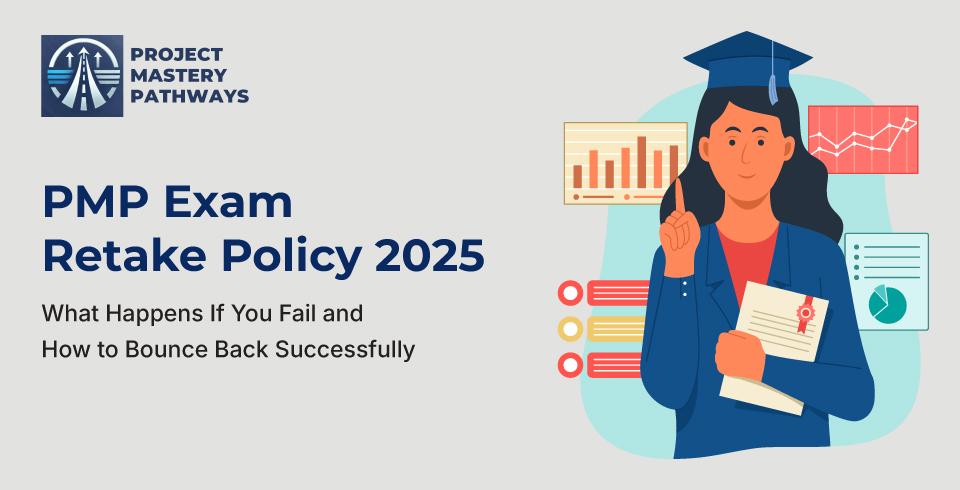Failing the PMP exam can feel devastating, especially after months of preparation and investment in study materials. You’re not alone—statistics show that approximately 40-50% of first-time test takers don’t pass the PMP certification exam. But here’s the good news: failing doesn’t mean your project management career aspirations are over. Understanding PMI’s retake policy and having a strategic recovery plan can transform your initial setback into ultimate success.
If you’re worried about what happens after a failed attempt or want to prepare for potential retakes, this comprehensive guide will walk you through everything you need to know about the PMP exam retake policy in 2025, associated costs, and proven strategies to pass on your next attempt.
Understanding the PMP Exam Retake Policy: Your Second (and Third) Chances
The Project Management Institute (PMI) understands that the PMP exam is challenging, which is why they’ve established a fair retake policy. Here’s what you need to know:
Retake Attempts: You can retake the PMP exam up to three times within your one-year eligibility period. This means you have a total of four attempts (one initial attempt plus three retakes) to pass the exam.
Waiting Period: After a failed attempt, you must wait 30 days before scheduling your retake. This cooling-off period is designed to give you time to analyze your performance and prepare more effectively.
Eligibility Period: Your eligibility to take the PMP exam lasts for one year from the date your application is approved. All retakes must occur within this timeframe. If you don’t pass within four attempts or your eligibility expires, you’ll need to reapply and go through the entire application process again.
The retake policy is particularly important for career changers and fresh graduates entering project management, as it provides multiple opportunities to demonstrate your competency without starting from scratch.
PMP Exam Retake Costs: Financial Planning for Multiple Attempts
Understanding the financial implications of retakes is crucial for budgeting your certification journey. For detailed information about PMP exam costs, here’s the current fee structure:
PMI Members:
- Initial exam fee: $405
- Retake fee: $275 per attempt
Non-PMI Members:
- Initial exam fee: $555 (increasing to $675 on August 6, 2025)
- Retake fee: $375 per attempt
Cost-Saving Tip: Becoming a PMI member ($139 annual fee) can save you money if you plan to retake the exam, as the membership fee plus reduced retake costs often total less than non-member retake fees.
Many aspiring project managers don’t budget for potential retakes, which can create financial stress. Planning for at least one retake attempt in your certification budget is a smart financial strategy, especially given the exam’s difficulty level.
Analyzing Your Performance: Learning from Failed Attempts

After receiving your exam results, PMI provides a detailed performance report showing your proficiency in each domain. This report is invaluable for targeted preparation:
Domain Analysis: The report shows whether you performed “Above Target,” “Target,” or “Below Target” in each of the three domains:
- People (42% of exam)
- Process (50% of exam)
- Business Environment (8% of exam)
Strategic Study Planning: Focus your retake preparation on domains where you scored “Below Target.” This targeted approach is more effective than generic studying and helps optimize your limited preparation time.
Understanding why candidates find the PMP exam difficult can help you avoid common pitfalls. The exam tests application of knowledge rather than memorization, which requires a different preparation approach for retakes.
Proven Strategies for PMP Exam Retake Success
Your retake strategy should be different from your initial preparation. Here’s how to approach it:
Gap Analysis: Identify specific knowledge gaps using your performance report. Don’t just study harder—study smarter by focusing on weak areas.
Practice Tests: Increase your mock exam frequency. Taking practice tests helps you identify question patterns and improve your time management skills.
Study Resources: Consider supplementing your original study materials with additional resources. Sometimes a different explanation or perspective can clarify confusing concepts.
Mindset Reset: Approach your retake with confidence rather than fear. Many successful PMPs failed their first attempt and used the experience to strengthen their understanding.
For comprehensive preparation, consider exploring project management fundamentals to strengthen your foundational knowledge before diving into advanced PMP concepts.
Your Path Forward: Turning Setbacks into Success
Remember, failing the PMP exam doesn’t reflect your potential as a project manager—it simply means you need more preparation time. Many successful project management professionals, including those who’ve obtained additional certifications, have failed their first attempt and gone on to build remarkable careers.
Ready to turn your PMP certification journey around? Subscribe to PMPwithRay for expert tips, study strategies, and motivation to help you succeed on your next attempt. For comprehensive preparation, explore my specialized PMP mock simulator and 35 PDU training course on Udemy to build the confidence and knowledge you need to pass with flying colors. Your PMP certification is within reach—sometimes it just takes a second try to get there.

